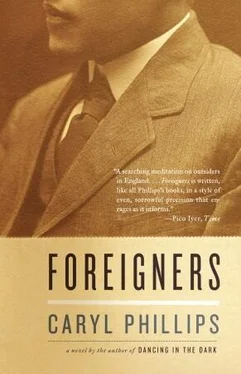In fact, black people have been present in English life since the time of the Roman occupation. There is very strong evidence that black Roman soldiers were stationed near Hadrian's Wall at the northern outpost of England, but the first really visible, permanent, group of black people in English life appeared towards the end of the sixteenth century. These Africans were brought to England in the wake of Sir John Hawkins' trading missions to Africa and the Americas, and were often treated as little more than exotic objects whose main function was to adorn the houses and palaces of the nobility and aristocrats upon whom the 'captives' were occasionally encouraged to serve. In 1601, concerned by the escalating numbers of coloured people in her kingdom, Queen Elizabeth I of England issued a proclamation ordering the expulsion of the 'blackamoors'. However, as the English trading mission transformed itself into the fabulously profitable business of slavery, hundreds of black people now began to find themselves adrift in England. By the late eighteenth century, England had a sizeable population of people of African origin, and these individuals were often able to form and maintain their own clubs and societies. In the nineteenth century, with the abolition of the slave trade, and the steady increase of instances of intermarriage, the black population began to decline significantly, and it was not to grow again in size until the late fifties and sixties with the advent of mass migration from the Caribbean. For most of the nineteenth and early twentieth centuries, there were vast sections of England where a coloured face had never been seen, and the appearance of an African or West Indian would be a truly alarming spectacle. This is how Lionel Fitzherbert Turpin must have appeared to the townsfolk of Leamington Spa in the early part of the twentieth century. After his untimely death, Lionel left a legacy of five mixed-race children in Leamington Spa, who not only constituted a truly unusual sight, but who were regarded by some intolerant locals as a social problem which they were ill-equipped to deal with.
By the time young 'Licker' Turpin reached fourteen, he was seldom attending school and it was clear that his life was in danger of taking a turn towards lawlessness. At the local Leamington Spa Boys' Club, a boxing section had recently been formed under the guidance of a local policeman, Inspector John 'Gerry' Gibbs, and an Italian former amateur welterweight champion named Ron Stefani. They both loved the physical skill and discipline of boxing, preferring the purity and dignity of the amateur ranks to what they perceived to be the chicanery and exploitation of the professional world. In 1942 they persuaded the young tearaway 'Licker' Turpin to come into the gym, and it soon became clear that the coloured lad possessed an extraordinary talent. He was quick, aggressive, and keen to learn, and he was also strong and eager to develop his strength by lifting weights. This was an unusual method of training, for traditionally fighters worried that it made them less lithe and supple; it was also believed that the new muscles might 'confuse' the boxing muscles, but the stubborn youngster continued to build up his strength with weights, a regime that he remained loyal to throughout the full length of his career.
The day young Randolph Turpin stepped into the Leamington Spa gym, boxing was already in his blood. His eldest brother Dick had turned professional as a two-pounds-a-bout boxer when Randy was only nine, and he was now establishing himself as a serious fighter. Jackie was also handy with his fists, but Gibbs and Stefani knew that the jewel in the family crown, and the kid who had everything, was young Randy. The following year, in 1943, when aged only fifteen, Turpin won the British junior 112 lb championship. In 1944 he won the British junior 133 lb championship, bringing even further glory to the name of Leamington Spa Boys' Club. However, with a war raging across the globe, nothing was going to be simple, including making a career and progressing as a boxer. His older brother Dick had joined the army and was on active duty, while Jackie had decided to join the Royal Navy. 'Licker' had now left school and was working as a labourer in a local builder's yard, but he decided to join the Royal Navy where he was assigned to duties as an assistant cook. This gave him plenty of time to continue to box, and in 1945 he achieved a unique double by winning both the junior ABA 147 lb British championship and the senior ABA title, which made him both the youngest boxer, and the first black boxer, to win an ABA senior championship. He also won the navy title, the Inter-Services title, and the following year the ABA senior middleweight championship. Those knowledgeable about the sport recognised the 'Leamington Licker' as the outstanding amateur oxing prospect in the country and the boy was still only seventeen.
After the war, 'Licker' returned to Leamington Spa and continued to fight as an amateur, but to him it made little financial sense, although both John 'Gerry' Gibbs and Ron Stefani were keen for him to remain an amateur and compete for an Olympic gold medal at the 1948 games in London. His brother Dick had already resumed his professional career, and Jackie, a promising featherweight, was also now ready to join the professional ranks and start earning some real money. In September 1946, eighteen-year-old Randolph Turpin became the third family member to box professionally, like his brothers before him, he did so under the management of a modest local businessman with round scholarly glasses and a pencil-thin moustache named George Middleton. With an outstanding amateur record of ninetyfive victories against just five losses, all the London managers were clamouring for Randy Turpin's signature, but the teenager preferred to remain with a local man whom he knew and trusted, rather than sign with a bigname manager. 'Licker's' professional career began handily enough on 17 September, 1946 with a first-round technical knockout of a journeyman named Gordon Griffiths. The boxing press were convinced that the youngster had made a successful transition to the professional ranks and one of them wrote: 'The way Turpin leapt on Griffiths, like a bronze tiger devouring a tethered kid, battering him halfway through the ropes until the referee intervened in the first round, was enough to prove that a new middleweight menace had arrived.' Thereafter, young Turpin put together an impressive string of twelve victories in 1947, often appearing on the undercard of fights that included his better known older brother, Dick. His progress was extremely impressive, but at nineteen he was not yet old enough to fight for a British title. In fact, the rules had only recently been changed to allow a black boxer to contest for a British title, and both George Middleton, and perhaps more importantly, the Turpins' mother, wanted Dick to have first crack at a title fight.
Professionally, things were undoubtedly progressing well for Randy, but the teenager's personal life was beginning to show signs of considerable strain. The Turpin boys, Dick, Jackie, and Randy, known collectively in the boxing fraternity as 'the dark threats', all had an eye for a pretty girl, and they were tough, they were cocky, and they walked with a considerable swagger. Local girls found the boys attractive, particularly young Randy who, despite his youth, seemed to rule the roost. Among Randy's sparring partners at the Leamington Boys' Club was a young Irish middleweight named Mick Stack who, although he was destined to never make the top grade as a professional, already showed considerable courage inside the ring. 'Licker' Turpin was often short of sparring partners, not only because of his renowned skill, but because he didn't seem to know when to go easy on those of lesser ability. Any sign of weakness was likely to be met with a beating, but equally any sign of resistance was taken as an affront and the young fighter would begin to dish out punishment. In short, Turpin was as much a 'hard case' in the gym as he was in the streets, and beyond his brothers, Dick and Jackie, there were few who dared to tie on a pair of gloves and give him a workout. But not fearless Mick Stack, who could not only hold his own, but he sometimes extended Turpin in a manner that others seldom could.
Читать дальше











![Unknown - [Carly Phillips] The Bachelor (The Chandler Brothe(Bookos.org) (1)](/books/174132/unknown-carly-phillips-the-bachelor-the-chandle-thumb.webp)
